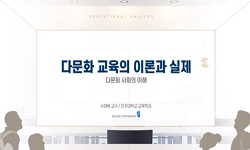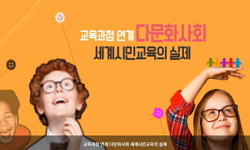With the advent of the global era, more and more people are moving away from their hometowns to study, work, etc. South Korea and Taiwan, both located in East Asia spotlighted from the world, are also facing this phenomenon. Consequently, the establis...
http://chineseinput.net/에서 pinyin(병음)방식으로 중국어를 변환할 수 있습니다.
변환된 중국어를 복사하여 사용하시면 됩니다.
- 中文 을 입력하시려면 zhongwen을 입력하시고 space를누르시면됩니다.
- 北京 을 입력하시려면 beijing을 입력하시고 space를 누르시면 됩니다.
https://www.riss.kr/link?id=T16618464
- 저자
-
발행사항
부산 : 부산외국어대학교 일반대학원, 2023
-
학위논문사항
학위논문(석사) -- 부산외국어대학교 일반대학원 , 한국학과 , 2023. 2
-
발행연도
2023
-
작성언어
한국어
- 주제어
-
KDC
331.5 판사항(5)
-
발행국(도시)
부산
-
기타서명
A Comparative study on perception of the multicultural policies in Korean and Taiwanese university students
-
형태사항
iv, 101 p. : 도표 ; 26 cm
-
일반주기명
부산외국어대학교 논문은 저작권에 의해 보호받습니다
지도교수: 정명숙
참고문헌 수록 -
UCI식별코드
I804:21022-200000662425
- 소장기관
-
0
상세조회 -
0
다운로드
부가정보
다국어 초록 (Multilingual Abstract)
This study is conducted through internet surveys and interviews. Chapter 2 is about the background of multicultural society and policies in Korea and Taiwan and Chapter 3 is about the university students' perception of multicultural policies. In Chapter 4, the perceptions of Korean and Taiwanese students are compared. Lastly, Chapter 5 will present the conclusions.
According to the results of the survey, I could distinguish some differences in perception between Korean and Taiwanese university students. First, Taiwan shows a relatively low approval rating for support for families composed of foreigners. In Taiwan, there are few policies for international marriage families but no policy for marriage families made up of non-Taiwanese foreigners on both sides. As a result, it is necessary to establish policies for all foreign migrants in Taiwan. Second, Korean and Taiwanese both show a low approval rating for the granting of the right to vote for migrants. Through the interviews, I found the reasons why both are against it and these reasons are different between the groups. Korean students oppose it because they are worried about the abuse of voting rights, but Taiwanese students do because it is difficult to judge how much the migrants could know about Taiwan. It reveals that if the Taiwan government establishes a comprehensive evaluation test for migrants with permanent residency, it can expand the political participation of migrants. Third, Korean students have a relatively negative perception of the budget for migrants-related projects. It means that the Korean government needs to improve its budget management system. Fourth, Taiwanese students have relatively low approval ratings for multicultural education policies. It is related to the fact that Taiwan's multicultural education policies are not integrated and the target of the multicultural education policies is not specified as well. Therefore, Taiwan needs to systematically integrate multicultural education policies.
In this global era, so many cultural exchanges are occurring in the world. Following up the increase in cultural and economic activities as time goes by, the ways how to understand various cultures and communicate with migrants are becoming very important skills for everyone. This study is expected to contribute to the improvement of multicultural policies in Korea and Taiwan. All governments should continue to promote social integration to decrease the conflicts between many kinds of gropus in their society. Therefore, it is necessary to improve and expand multicultural policies so that people can positively perceive multiculturalism.
With the advent of the global era, more and more people are moving away from their hometowns to study, work, etc. South Korea and Taiwan, both located in East Asia spotlighted from the world, are also facing this phenomenon. Consequently, the establishment of multicultural policies which can promote social integration is important as many nationalities meet and gather in those areas. This study aims to analyze the perception of multicultural policies among Korean and Taiwanese university students and raise suggestions for policy improvement.
This study is conducted through internet surveys and interviews. Chapter 2 is about the background of multicultural society and policies in Korea and Taiwan and Chapter 3 is about the university students' perception of multicultural policies. In Chapter 4, the perceptions of Korean and Taiwanese students are compared. Lastly, Chapter 5 will present the conclusions.
According to the results of the survey, I could distinguish some differences in perception between Korean and Taiwanese university students. First, Taiwan shows a relatively low approval rating for support for families composed of foreigners. In Taiwan, there are few policies for international marriage families but no policy for marriage families made up of non-Taiwanese foreigners on both sides. As a result, it is necessary to establish policies for all foreign migrants in Taiwan. Second, Korean and Taiwanese both show a low approval rating for the granting of the right to vote for migrants. Through the interviews, I found the reasons why both are against it and these reasons are different between the groups. Korean students oppose it because they are worried about the abuse of voting rights, but Taiwanese students do because it is difficult to judge how much the migrants could know about Taiwan. It reveals that if the Taiwan government establishes a comprehensive evaluation test for migrants with permanent residency, it can expand the political participation of migrants. Third, Korean students have a relatively negative perception of the budget for migrants-related projects. It means that the Korean government needs to improve its budget management system. Fourth, Taiwanese students have relatively low approval ratings for multicultural education policies. It is related to the fact that Taiwan's multicultural education policies are not integrated and the target of the multicultural education policies is not specified as well. Therefore, Taiwan needs to systematically integrate multicultural education policies.
In this global era, so many cultural exchanges are occurring in the world. Following up the increase in cultural and economic activities as time goes by, the ways how to understand various cultures and communicate with migrants are becoming very important skills for everyone. This study is expected to contribute to the improvement of multicultural policies in Korea and Taiwan. All governments should continue to promote social integration to decrease the conflicts between many kinds of gropus in their society. Therefore, it is necessary to improve and expand multicultural policies so that people can positively perceive multiculturalism.
목차 (Table of Contents)
- I. 서론 1
- 1. 연구의 필요성과 목적 1
- 2. 선행 연구 검토 2
- 3. 연구 내용과 방법 8
- I. 서론 1
- 1. 연구의 필요성과 목적 1
- 2. 선행 연구 검토 2
- 3. 연구 내용과 방법 8
- II. 한국과 대만의 다문화정책 17
- 1. 한국과 대만의 다문화사회 형성 배경 17
- 1.1 한국의 다문화사회 형성 배경 17
- 1.2 대만의 다문화사회 형성 배경 19
- 2. 한국과 대만의 다문화정책 비교 21
- 2.1 한국의 다문화정책 21
- 2.2 대만의 다문화정책 34
- III. 한국과 대만 대학생의 다문화정책에 대한 인식 조사 46
- 1. 한국 대학생의 인식 조사 46
- 1.1 결혼이민자의 생활정착 지원정책 50
- 1.2 이주민 자녀의 교육 지원정책 56
- 2. 대만 대학생의 인식 조사 60
- 2.1 결혼이민자의 생활정착 지원정책 63
- 2.2 이주민 자녀의 교육 지원정책 70
- IV. 한국과 대만 대학생의 다문화정책에 대한 인식 비교 75
- 1. 결혼이민자의 생활정착 지원에 대한 인식 75
- 2. 이주민 자녀의 교육 지원에 대한 인식 79
- V. 결론 84
- 참고문헌 86
- 부록A - 한국어 설문지 90
- 부록B - 중국어 설문지 95
- ABSTRACT 100












